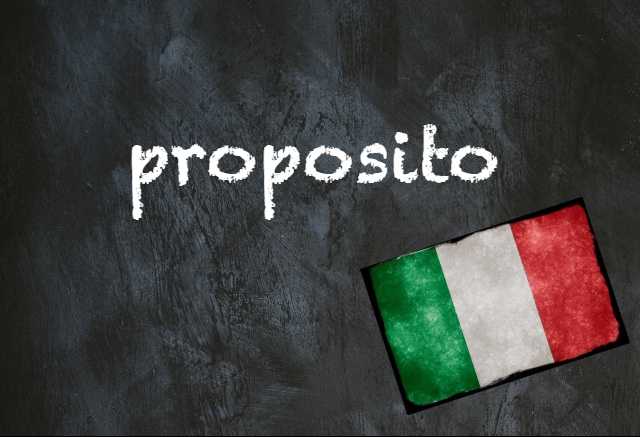Italian word of the day: ‘Proposito’

There’s a lot to be said with regard to this word.
You’ll hear proposito used in such wide variety of contexts in Italy that without a primer, foreigners can easily be left wondering exactly what it translates to.
That’s because proposito is a versatile word that means a number of different things in English depending on the situation you use it in and the preposition you use it with.
To start with, it can mean a firm purpose, objective, resolution, or plan.
Il suo proposito è di andarsene entro gennaio.
Her objective is to leave by January.
Lui è molto ostinato nei suoi propositi, nessuno può smuoverlo.
He’s very dogged in his resolutions, no one can change his mind.
Che propositi avete per il futuro?
What plans do you have for the future?
Since proposito in this context is something you intend or plan to do, doing something ‘on purpose’ or deliberately is doing it di proposito.
Non l'ho mica fatto di proposito!
I certainly didn’t do it on purpose!
Pensa che tu abbia fallito l’esame di proposito per poter rimanere nella stessa classe di Sara.
She thinks you failed the exam on purpose so you could stay in the same class as Sara.

Aside from this, proposito can also be a topic or subject matter.
Lei pensa solo a questo proposito.
She thinks of nothing else but this.
Ho già qualche idea a proposito.
I already have some ideas on the subject.
When used in this way, we can combine proposito with the preposition ‘a’ to form the phrases a questo proposito, meaning ‘with regard to this’, or a proposito di…, meaning ‘with regard to…’, ‘about…’, or ‘on the subject of…’.
Ci sono alcune domande che potrebbero aiutarci a questo proposito.
There are a few questions that might help us in this regard.
A proposito di compiti, non mi hai ancora mostrato i tuoi.
Speaking of homework, you still haven’t shown me yours.
Volevo parlarti a proposito di Giovanni.
I wanted to speak with you about Giovanni.
Similarly, in proposito means ‘in this regard’ or ‘with regard to this’ when referring back to something that has just been discussed.
Le ho rivolto qualche domanda in proposito.
I’ve sent you a few questions in connection with this matter.
Il governo ha una notevole responsabilità in proposito.
The government bears a good deal of responsibility in this respect.
Finally, we can use a proposito either to mean ‘opportunely’ or appropriately; or, conversationally, to mean ‘by the way’.
Vieni a proposito!
You’re coming at the right time!
A proposito, io sono a favore.
By the way, I think it’s a good thing.
Potete chiamarmi Laura, a proposito.
You can all call me Laura, by the way.
With many Italian words, you can put an ‘s’ at the beginning to turn its meaning on its head, and this holds true with proposito, as a spoprosito means inopportune, or inappropriate; while the noun uno sproposito means a blunder.
Forse ho parlato a sproposito.
Perhaps I spoke out of turn.
È stato uno sproposito reagire così.
It was a mistake to react like this.
See if you can use the word in conversation a proposito (not a sproposito!) this week.
Do you have an Italian word you’d like us to feature? If so, please email us with your suggestion.
Comments
See Also
You’ll hear proposito used in such wide variety of contexts in Italy that without a primer, foreigners can easily be left wondering exactly what it translates to.
That’s because proposito is a versatile word that means a number of different things in English depending on the situation you use it in and the preposition you use it with.
To start with, it can mean a firm purpose, objective, resolution, or plan.
Il suo proposito è di andarsene entro gennaio.
Her objective is to leave by January.
Lui è molto ostinato nei suoi propositi, nessuno può smuoverlo.
He’s very dogged in his resolutions, no one can change his mind.
Che propositi avete per il futuro?
What plans do you have for the future?
Since proposito in this context is something you intend or plan to do, doing something ‘on purpose’ or deliberately is doing it di proposito.
Non l'ho mica fatto di proposito!
I certainly didn’t do it on purpose!
Pensa che tu abbia fallito l’esame di proposito per poter rimanere nella stessa classe di Sara.
She thinks you failed the exam on purpose so you could stay in the same class as Sara.

Aside from this, proposito can also be a topic or subject matter.
Lei pensa solo a questo proposito.
She thinks of nothing else but this.
Ho già qualche idea a proposito.
I already have some ideas on the subject.
When used in this way, we can combine proposito with the preposition ‘a’ to form the phrases a questo proposito, meaning ‘with regard to this’, or a proposito di…, meaning ‘with regard to…’, ‘about…’, or ‘on the subject of…’.
Ci sono alcune domande che potrebbero aiutarci a questo proposito.
There are a few questions that might help us in this regard.
A proposito di compiti, non mi hai ancora mostrato i tuoi.
Speaking of homework, you still haven’t shown me yours.
Volevo parlarti a proposito di Giovanni.
I wanted to speak with you about Giovanni.
Similarly, in proposito means ‘in this regard’ or ‘with regard to this’ when referring back to something that has just been discussed.
Le ho rivolto qualche domanda in proposito.
I’ve sent you a few questions in connection with this matter.
Il governo ha una notevole responsabilità in proposito.
The government bears a good deal of responsibility in this respect.
Finally, we can use a proposito either to mean ‘opportunely’ or appropriately; or, conversationally, to mean ‘by the way’.
Vieni a proposito!
You’re coming at the right time!
A proposito, io sono a favore.
By the way, I think it’s a good thing.
Potete chiamarmi Laura, a proposito.
You can all call me Laura, by the way.
With many Italian words, you can put an ‘s’ at the beginning to turn its meaning on its head, and this holds true with proposito, as a spoprosito means inopportune, or inappropriate; while the noun uno sproposito means a blunder.
Forse ho parlato a sproposito.
Perhaps I spoke out of turn.
È stato uno sproposito reagire così.
It was a mistake to react like this.
See if you can use the word in conversation a proposito (not a sproposito!) this week.
Do you have an Italian word you’d like us to feature? If so, please email us with your suggestion.

Join the conversation in our comments section below. Share your own views and experience and if you have a question or suggestion for our journalists then email us at [email protected].
Please keep comments civil, constructive and on topic – and make sure to read our terms of use before getting involved.
Please log in here to leave a comment.